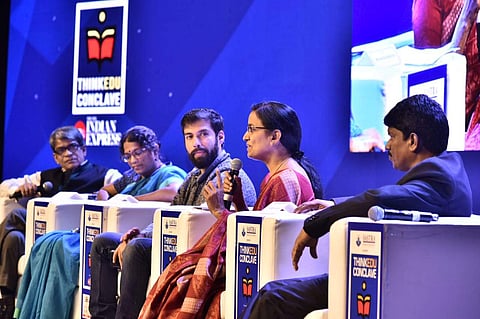

It is important to recognise and address the fact that the learning crisis in India is not just the issue of Government schools alone, said former Commissioner of School Education, Andhra Prades, Sandhya Rani K, on Wednesday. Speaking at the ThinkEdu Conclave 2020 organised by The New Indian Express (TNIE) in Chennai, Sandhya said that we should concentrate on making all schools work for children rather than just focusing on Government or Private schools separately. "It is not Government vs Private schools. Though they are seen as competitors and public perception is that private schools are better than the average Government schools, learning outcomes in Private schools is only marginally better than the former. And in some other instances, the Private schools are doing poorly in terms of infrastructure, administration, resources, qualified teachers, poor pay and more," she added while speaking on the topic 'Education Innovations: Making Government Institutions Work'. The panel also included Revathi Radhakrishnan, former filmmaker and educator; Milind Chandwani, Founder of Camp Diaries; K Vivekanandan, Director of Technical Education, and it was chaired by well-known author and columnist Shankkar Aiyar.
Addressing hundreds of students and delegates in the two-day conclave, which will end on Thursday, the panellists spoke on the current issues with school education in our country and discussed possible solutions. Posing the question of who is being left out, Revathi said that tribal children are affected the most. "Lakhs of people don't have community certificates, which means they don't get access to facilities that the others with certificates can make use of," she said, adding that inclusion would not only mean including these children in the enrollment ratios but creating actual solutions to provide them with basic and quality education. "All the CSR efforts go to the city schools but how many village schools do they reach? This problem has to be solved," she said. Revathi started the Vanavil Trust in Nagapattinam, Tamil Nadu, to work with the nomadic tribal communities in the sectors of education, health and livelihoods. Her organisation imparts quality education to these tribal children with the help of alternative teaching methods.
Weighing in, Camp Diaries' founder Milind Chandwani said that he believes that the problem lies with the system when it comes to teacher absenteeism in our schools. "Our education system doesn't offer any incentive to teachers, to get nominated for an award one has to pay around ₹25,000. We should be more grateful to teachers. Intervention is needed and more investment as well," he added. His NGO, Camp Diaries, empowers children from government or low-income private schools through eight diverse extra-curricular activities such as beat-boxing, arts and crafts, dance, theatre and more in Hyderabad, Bengaluru and Ahmedabad.
When it was her turn to weigh in, Sandhya put forward three questions to the audience, "How many of you are products of government institutions? How many of you are associated with Government schools in some way or the other? How many of you believe that we should do away with Government schools?". Explaining why she posed these questions to the audience, she said, "Every Government school has a story of its own — constrained with resources, teachers, students coming from difficult family backgrounds — finding long-term strategies have become difficult for us." However, K Vivekanandan said that the Tamil Nadu government is spending ₹25,000 crore on school education and at least ₹4,000-5,000 crore for higher and technical education. "Teachers are being trained every weekend addressing children's issues; school education is in sync with higher education," he added.
Sandhya also said that some of the state governments are doing great work in terms of school education. "The Delhi government allocated 25 per cent of its budget for school education. The Rajasthan government has worked with fragmented schools — all schools in the Panchayat belong to one school headmaster now. The Andhra Pradesh government has been leveraging technology — governance, transparency, supporting teachers to develop skills, enabling access to new knowledge, engaging students more actively in digital classrooms and in terms of tracking their performance," she said. Adding to that she said that good analytical tools need to be used to address specific issues. "Technology is one major solution provider but that's not all. Investment in public education is necessary. All political parties should have a clear education strategy and action plans, and work on them for the next 20 years — that's how long it will take," she added.
Concluding the session, Shankkar Aiyar said that investing in education is the primary problem with the system, "whether they are interested in education is the question. We have the possibility to improve but it depends on how well the government takes it."
